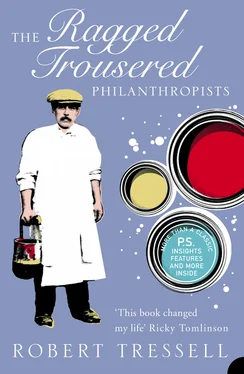At twelve o’clock Bob Crass – the painters’ foreman – blew a prolonged blast upon a whistle and all hands assembled in the kitchen, where Bert the apprentice had already prepared the tea, which was ready in the large galvanized iron pail that he had placed in the middle of the floor. By the side of the pail were a number of old jam-jars, mugs, dilapidated tea-cups and one or two empty condensed milk tins. Each man on the ‘job’ paid Bert threepence a week for the tea and sugar – they did not have milk – and although they had tea at breakfast-time as well as at dinner, the lad was generally considered to be making a fortune.
Two pairs of steps, laid parallel on their sides at a distance of about eight feet from each other, with a plank laid across, in front of the fire, several upturned pails, and the drawers belonging to the dresser, formed the seating accommodation. The floor of the room was covered with all manner of debris, dust, dirt, fragments of old mortar and plaster. A sack containing cement was leaning against one of the walls, and a bucket containing some stale whitewash stood in one corner.
As each man came in he filled his cup, jam-jar or condensed milk tin with tea from the steaming pail, before sitting down. Most of them brought their food in little wicker baskets which they held on their laps or placed on the floor beside them.
At first there was no attempt at conversation and nothing was heard but the sounds of eating and drinking and the frizzling of the bloater which Easton, one of the painters, was toasting on the end of a pointed stick at the fire.
‘I don’t think much of this bloody tea,’ suddenly remarked Sawkins, one of the labourers.
‘Well it oughter be all right,’ retorted Bert; ‘it’s been bilin’ ever since ‘arf past eleven.’
Bert White was a frail-looking, weedy, pale-faced boy, fifteen years of age and about four feet nine inches in height. His trousers were part of a suit that he had once worn for best, but that was so long ago that they had become too small for him, fitting rather tightly and scarcely reaching the top of his patched and broken hob-nailed boots. The knees and the bottoms of the legs of his trousers had been patched with square pieces of cloth, several shades darker than the original fabric, and these patches were now all in rags. His coat was several sizes too large for him and hung about him like a dirty ragged sack. He was a pitiable spectacle of neglect and wretchedness as he sat there on an upturned pail, eating his bread and cheese with fingers that, like his clothing, were grimed with paint and dirt.
‘Well then, you can’t have put enough tea in, or else you’ve bin usin’ up wot was left yesterday,’ continued Sawkins.
‘Why the bloody ‘ell don’t you leave the boy alone?’ said Harlow, another painter. ‘If you don’t like the tea you needn’t drink it. For my part, I’m sick of listening to you about it every damn day.’
‘It’s all very well for you to say I needn’t drink it,’ answered Sawkins, ‘but I’ve paid my share an’ I’ve got a right to express an opinion. It’s my belief that ’arf the money we gives ‘im is spent on penny ’orribles: ’e’s always got one in ’is hand, an’ to make wot tea ’e does buy last, ’e collects all the slops wot’s left and biles it up day after day.’
‘No, I don’t!’ said Bert, who was on the verge of tears. ‘It’s not me wot buys the things at all. I gives all the money I gets to Crass, and ’e buys them ’imself, so there!’
At this revelation, some of the men furtively exchanged significant glances, and Crass, the foreman, became very red.
‘You’d better keep your bloody thruppence and make your own tea after this week,’ he said, addressing Sawkins, ‘and then p’raps we’ll ’ave a little peace at meal-times.’
‘An’ you needn’t ask me to cook no bloaters or bacon for you no more,’ added Bert, tearfully, ‘cos I won’t do it.’
Sawkins was not popular with any of the others. When, about twelve months previously, he first came to work for Rushton & Co., he was a simple labourer, but since then he had ‘picked up’ a slight knowledge of the trade, and having armed himself with a putty-knife and put on a white jacket, regarded himself as a fully qualified painter. The others did not perhaps object to him trying to better his condition, but his wages – fivepence an hour – were twopence an hour less than the standard rate, and the result was that in slack times often a better workman was ‘stood off’ when Sawkins was kept on. Moreover, he was generally regarded as a sneak who carried tales to the foreman and the ‘Bloke’. Every new hand who was taken on was usually warned by his new mates ‘not to let the b—r Sawkins see anything.’
The unpleasant silence which now ensued was at length broken by one of the men, who told a dirty story, and in the laughter and applause that followed, the incident of the tea was forgotten.
‘How did you get on yesterday?’ asked Crass, addressing Bundy, the plasterer, who was intently studying the sporting columns of the Daily Obscurer.
‘No luck,’ replied Bundy, gloomily. ‘I had a bob each way on Stock well, in the first race, but it was scratched before the start.’
This gave rise to a conversation between Crass, Bundy, and one or two others concerning the chances of different horses in the morrow’s races. It was Friday, and no one had much money, so at the suggestion of Bundy, a Syndicate was formed, each member contributing threepence, for the purpose of backing a dead certainty given by the renowned Captain Kiddem of the Obscurer. One of those who did not join the syndicate was Frank Owen, who was as usual absorbed in a newspaper. He was generally regarded as a bit of a crank: for it was felt that there must be something wrong about a man who took no interest in racing or football and was always talking a lot of rot about religion and politics. If it had not been for the fact that he was generally admitted to be an exceptionally good workman, they would have had but little hesitation about thinking that he was mad. This man was about thirty-two years of age, and of medium height, but so slightly built that he appeared taller. There was a suggestion of refinement in his clean-shaven face, but his complexion was ominously clear, and an unnatural colour flushed the thin cheeks.
There was a certain amount of justification for the attitude of his fellow workmen, for Owen held the most unusual and unorthodox opinions on the subjects mentioned.
The affairs of the world are ordered in accordance with orthodox opinions. If anyone [did not think in accordance with these he soon discovered this fact for himself. Owen saw that in the world a small class of people were] possessed of a great abundance and superfluity of the things that are produced by work. He saw also that a very great number – in fact, the majority of the people – lived on the verge of want; and that a smaller but still very large number lived lives of semi-starvation from the cradle to the grave; while a yet smaller but still very great number actually died of hunger, or, maddened by privation, killed themselves and their children in order to put a period to their misery. And strangest of all – in his opinion – he saw that people who enjoyed abundance of the things that are made by work, were the people who did Nothing: and that the others, who lived in want or died of hunger, were the people who worked. And seeing all this he thought that it was wrong, that the system that produced such results was rotten and should be altered. And he had sought out and eagerly read the writings of those who thought they knew how it might be done.
It was because he was in the habit of speaking of these subjects that his fellow workmen came to the conclusion that there was probably something wrong with his mind.
Читать дальше












